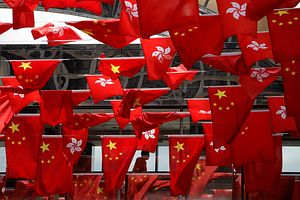[ad_1]

China and Kong Hong national flags are displayed outside a shopping center in Hong Kong Wednesday, June 28, 2017 to mark the 20th anniversary of Hong Kong handover to China.
Credit: AP Photo/Kin Cheung
On March 11, China closed out the annual session of its National People’s Congress. It was an eventful session. The NPC not only approved the 14th Five-Year Plan, but it also passed a last-minute addition to the agenda: a “decision on improving the electoral system of the Hong Kong Special Administrative Region.” (For a full overview of the NPC’s activities, see the invaluable NPC Observer).
The decision (Xinhua has an English summary here; Chinese text here), which passed by a vote of 2,895 to 0 (with one abstention) overhauls Hong Kong’s electoral system, placing further restriction on the SAR’s already limited democracy. Among the concrete changes: The election committee that votes on Hong Kong’s top official, the chief executive, will be expanded from 1,200 to 1,500 members. Candidates for chief executive must be nominated by at least 15 members of each sector in the committee, which will effectively restrict even nominations to pro-Beijing candidates. The election committee will also be given the new task of voting on an unspecified number of legislators.
Hong Kong’s Legislative Council, meanwhile, will be expanded from 70 to 90 members; the breakdown between members elected by the election committee, those directly elected through geographic constituencies, and those elected by functional constituencies remains unsettled. A new “candidate qualification review committee” will be set up to vet candidates for chief executive, LegCo seats, and the election committee itself – presumably to ensure they are verified “patriots,” given the emphasis on that in discussion of the changes.
In the past, pro-democrats have been removed from office for allegedly supporting “Hong Kong independence” or encouraging foreign governments to “interfere in Hong Kong affairs.” In the future, they won’t even be allowed to run. Many have also been arrested for violating the National Security Law, which makes those actions crimes punishable by up to life in prison.
The details of the changes will be further fleshed out by the NPC Standing Committee in future meetings. The Standing Committee will undertake the actual amendments to Annex I and II of Hong Kong’s Basic Law, which lay out the election procedures for the chief executive and LegCo, respectively. After the Standing Committee acts, Hong Kong will amend its laws to match.
It’s unclear if all these steps will happen before Hong Kong’s LegCo elections, scheduled for September 2021. That has led to speculation that the elections will be pushed back yet again. They were originally due to be held in September 2020 but were postponed – ostensibly due to COVID-19, but critics saw a bid to undermine the pro-democrats’ chances.
As with the National Security Law, the electoral reforms were approved by the NPC, with the detailed legislation to be passed by the NPC’s Standing Committee and handed down to Hong Kong effectively by fiat. But the Hong Kong government has been vocal about its support for the changes. In a statement on March 5, Chief Executive Carrie Lam said, “The Hong Kong SAR Government and I fully respect that the central government takes the lead to improve the electoral system.” She promised to “fully cooperate” with the central government in enacting local legislation to implement the changes.
“Under this constitutional order and political system, it is a natural requirement that Hong Kong must be governed by patriots,” Lam said. She defined the scope of “persons administering Hong Kong” – the people required to be patriots – to include “members of the legislature, judges in the Judiciary, members of district organizations which are not organs of political power, i.e. District Councils, as well as civil servants.” That surpasses even the scope of the electoral reform bill, and will deepen existing fears about the future of Hong Kong’s judiciary and civil service.
In a separate statement after the decision was officially approved on March 11, Hong Kong Chief Secretary Matthew Cheung said “he strongly supports the passage of the decision as it laid a solid foundation for improving Hong Kong’s electoral system, which is of a pressing need.”
China’s state media have also gone into overdrive promoting the new law – particularly for foreign audiences. Xinhua’s English-language website ran an entire article explaining “why Hong Kong people support improving [the] electoral system.” The article cited think tank surveys and petitions as evidence of public support for the move, which was framed as providing a final end to the “escalating political turmoil.”
When the Beijing-based legislature passed a decision restricting Hong Kongers’ ability to elect their own legislators, “The voice of the Hong Kong people was heard,” Xinhua declared, utterly without irony.
[ad_2]
Source link